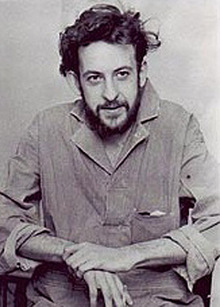D. A. Levy facts for kids
d.a. levy (born Darryl Alfred Levey, October 29, 1942 – November 24, 1968) was an American poet, artist, and publisher. He was active in the 1960s, mostly in Cleveland, Ohio. He always signed his work using only small letters, like "d.a. levy."
About d.a. levy
Levy was born in Cleveland, Ohio. After high school and a short time in the Navy, he decided to read and write as much as he could. He wanted to explore big ideas and find deeper meaning in life.
He found a creative way to share his ideas by publishing books and poems. He used a small printing press. During this time, he also became very interested in Buddhism, a spiritual path, even though he was born Jewish.
Levy published his own writings and the works of other artists. He printed them on his hand press or used a mimeograph machine. He ran his own publishing groups called Renegade Press and Seven Flowers Press. He was very aware of the growing art scene in Cleveland. He felt it was important to express this art, which he saw as a way to gain enlightenment. However, his strong artistic views sometimes caused problems with the political leaders of the time.
Legal Challenges
In the 1960s, d.a. levy faced legal challenges because of his poetry. Some people found his poems controversial. In 1966 and 1967, he was arrested, and his printing equipment was taken away.
His case became well-known and many people supported him. Famous artists like Allen Ginsberg and Tuli Kupferberg held a special poetry reading in 1967 to help him. The case lasted for about a year. In 1968, the charges against Levy were dropped. He agreed to pay a small fine and not share his poetry with young people.
Levy was a friend of William Fiske, whose father, Irving Fiske, helped create the Quarry Hill Creative Center.
His Passing
d.a. levy passed away on November 24, 1968, when he was 26 years old. He was cremated. Half of his ashes are buried in Whitehaven Memorial Park in Mayfield Heights, Ohio. The other half are kept by an artist named George Fitzpatrick. He plans to use them in a special painting that features Levy's words.
His Writings
Levy is well-known for his works like The North American Book of the Dead, Cleveland Undercovers, and Suburban Monastery Death Poem. Later, his book Tombstone as a Lonely Charm became popular again.
From 1967 to 1968, Levy also published Cleveland's first underground newspaper. It was called the Buddhist Third-Class Junkmail Oracle.
His first poems were often written entirely in lowercase letters. Some people might have thought they looked a bit messy. When he made copies of his writings using a mimeograph machine (which was like an early form of a zine), his poems sometimes had spelling mistakes. This might have been his artistic style, an error, or simply because it was hard to correct mistakes on the mimeograph stencils.
Levy also experimented with concrete poetry. This is a type of poetry where the way the words look on the page is as important as their meaning. In works like "The Tibetan Stroboscope," he used the simple copies from the mimeograph machine to create images of blurry or hard-to-read text. He combined these with pictures of Buddhist art and cut-out phrases from magazines. For example, he used the phrase "NIBBANA IS NOT AN Air-conditioned Salesroom."
As Levy became more involved in Buddhism and the Cleveland art scene, his poems sometimes became more playful. He would use "mistakes" in spelling and grammar to create different meanings. He also started using long lines of capital letters in his later works.
In 2011, many years after his death, two of Levy's poems were translated into Hebrew. They were published in Maayan, an Israeli poetry magazine [1].


